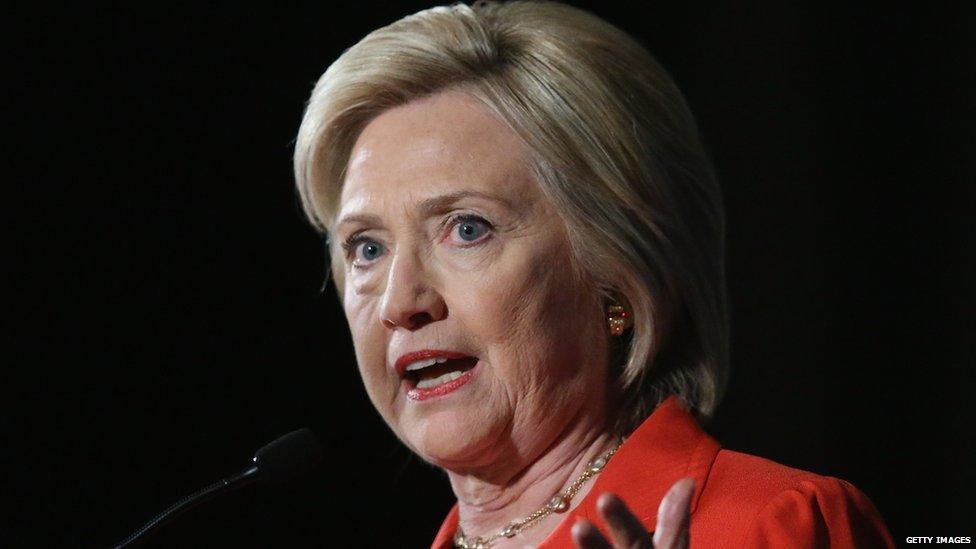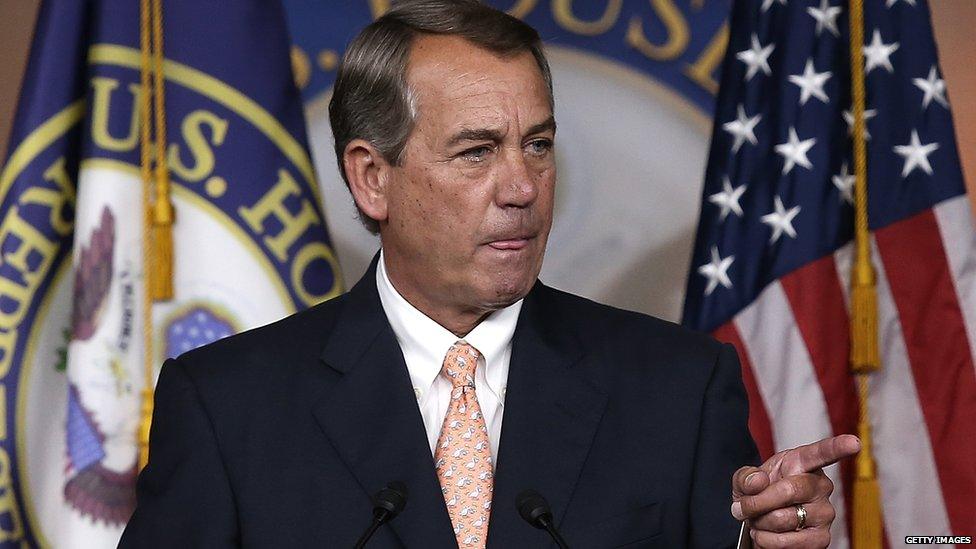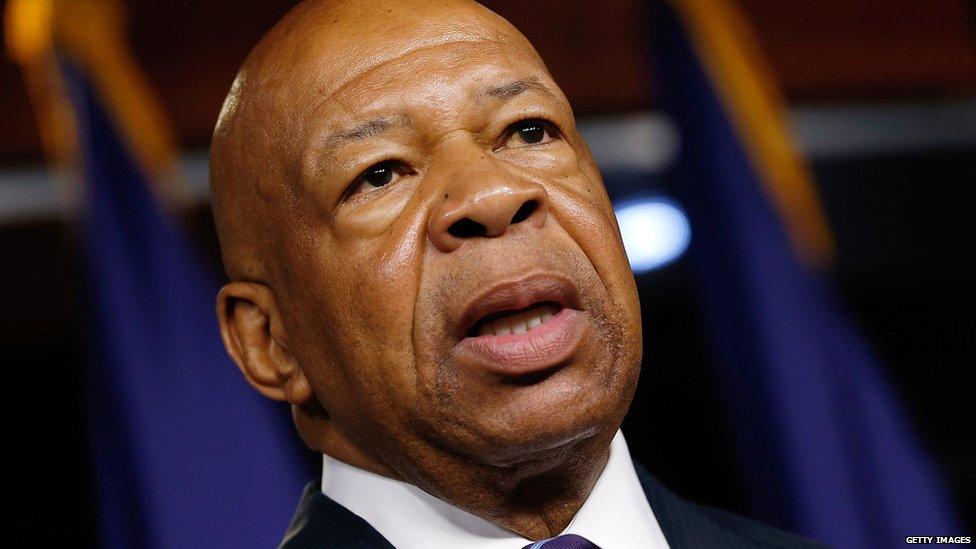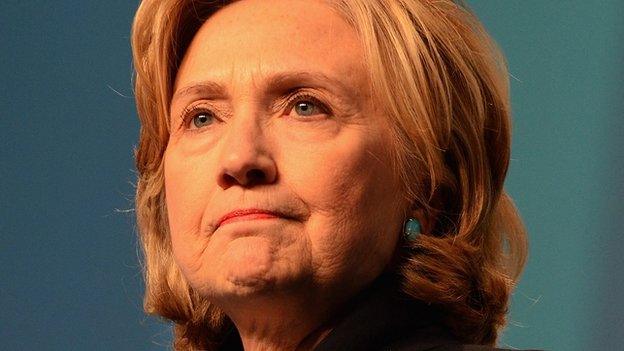Clinton sent emails containing classified information
- Published

Democratic presidential candidate Hillary Clinton sent at least four messages from her personal email server while she was US secretary of state that contained information derived from classified material, according to a US government inspector general.
The four emails "were classified when they were sent and are classified now," Andrea Williams, a spokesperson for I Charles McCullough, inspector general of the intelligence community, tells Byron Tau, external of the Wall Street Journal.
Tau reports that the inspector general delivered a letter to Congress on Thursday asserting that Mrs Clinton should not have been using her personal server to send such information.
"None of the emails we reviewed had classification or dissemination markings, but some included [intelligence community]-derived classified information and should have been handled as classified, appropriately marked and transmitted via a secure network," McCullough wrote.
Mishandling classified information is prohibited by federal law, and numerous government employees, including former CIA head David Petraeus, have been charged with violations in recent years. Tau reports that the inspector general has provided relevant information to the counterintelligence division of the Federal Bureau of Investigation for further investigation.
Mrs Clinton's use of a private system for all her emails while working in the Obama administration first came to light in March and generated a storm of controversy. Critics alleged that her particular set-up was unsecure, contrary to government policy, and designed to shield her communications from government and media oversight.
This latest revelation comes on the heels of a New York Times article about two memos - written by McCullough and state department inspector general Steve Linick - claiming Mrs Clinton's server may contain "hundreds of potentially classified emails" and that one such sensitive email had already been released by the department to the public.
The Times article reports that the matter has been recommended for a "criminal investigation", although the Justice Department has since denied the assertion.

"I want to say a word about what's in the news today. It's because there have been a lot of inaccuracies. We all have a responsibility to get this right," Mrs Clinton said in a speech in New York on Friday afternoon. "We are all accountable to get the facts right. I will do my part. But I'm also going to stay focused on the issues, particularly the big issues that really matter to American families."
Mrs Clinton has repeatedly said that her private email contained no information that was classified at the time, and a campaign representative, Nick Merrill, released a statement, external standing by that assertion.
Mrs Clinton, Merrill said, "followed appropriate practices in dealing with classified materials. As has been reported on multiple occasions, any released emails deemed classified by the administration have been done so after the fact, and not at the time they were transmitted."
The information reported on by the Wall Street Journal could undermine that claim, however, depending on how one interprets the status an email based on classified information but not actually containing officially classified documents.
These kind of blurry lines have prompted some to condemn the way the US classifies information - and the discretion granted investigators on when and where to launch prosecutions.
"The 'state secrets' laws in question are applied with extreme unevenness and unpredictability," writes, external the Atlantic's Conor Friedersdorf.
The State Department is currently reviewing 55,000 emails turned over by Mrs Clinton in December, making them available to the public in small batches through the beginning of next year. About 3,000 emails, some containing portions redacted due to after-the-fact classification, have been released so far.
Republicans, such as Speaker of the House John Boehner, have called, external for Mrs Clinton to turn over her entire server for inspection - although information on the server may have already been deleted.
The Times article further notes that the State Department has been accused of being too slow in responding to media freedom of information requests and providing emails to a Republican-led investigation into the 2012 attack on the US consulate in Benghazi, Libya, that led to the death of US Ambassador Chris Stevens.
While this latest revelation has once again put the subject of Mrs Clinton's private email system into the headlines, the New York Times reporting has also become the focus of contention. When its article was first published online Thursday night, the story asserted that the investigation was directly into whether Mrs Clinton, herself, "mishandled sensitive government information".

House Speaker John Boehner is callin for Mrs Clinton to turn over her private email server
Clinton sent emails containing classified information
In later versions, the article read that the investigation was into "whether sensitive government information was mishandled".
One of the Times story authors, Michael Schmidt, told Politico, external on Friday that the alteration was "a response to complaints we received from the Clinton camp that we thought were reasonable".
The change prompted howls of outrage from both the left and the right.
Clinton supporters charged that this was yet another example of the Times making a Clinton story seem more damning than it actually is.
"Aside from the fact that the buck stops at the top, there's nothing here that's specifically about Clinton," writes, external Kevin Drum of Mother Jones. "And yet, the Times writers originally made their lede all about Hillary, almost as if on autopilot."
A key Democrat in Congress echoed this concern.

Congressman Elijah Cummings says the latest stories are based on "inaccurate leaks"
"This is the latest example in a series of inaccurate leaks to generate false front-page headlines - only to be corrected later - and they have absolutely nothing to do with the attacks in Benghazi or protecting our diplomatic corps overseas," said, external Representative Elijah Cummings, the ranking Democrat on the congressional committee investigating the Libya attack.
The right, on the other hand, viewed the change as a left-leaning Times caving to pressure from the Clinton campaign.
"All I'm getting from NYT rewrite is that some schmo who worked for Hillary will be taking the fall for any mishandling of sensitive info," tweets New York Post columnist Karol Markowicz.
The Times appended a correction to its original story on Friday afternoon, stating that the article "misstated the nature of the referral".
"The referral addressed the potential compromise of classified information in connection with that personal email account," the note read. "It did not specifically request an investigation into Mrs Clinton."
A Justice Department investigation, whether Mrs Clinton is directly targeted or not, could mark a new, much more serious phase of a story that already appears to be taking its toll on the public's views of Mrs Clinton's honesty and trustworthiness, external.
On Friday Mrs Clinton outlined a proposal, external for increasing taxes on short-term capital gains to encourage what she sees as more valuable long-term investment.
It's Mrs Clinton's latest attempt to advance a populist economic message that could appeal to her base - but the story appears destined to be buried amid yet another fury over her email practices.
It's quite early in the game, but a campaign that can't consistently push its message out to the public without distraction is a campaign that's in trouble.
- Published3 March 2015

- Published6 November 2016